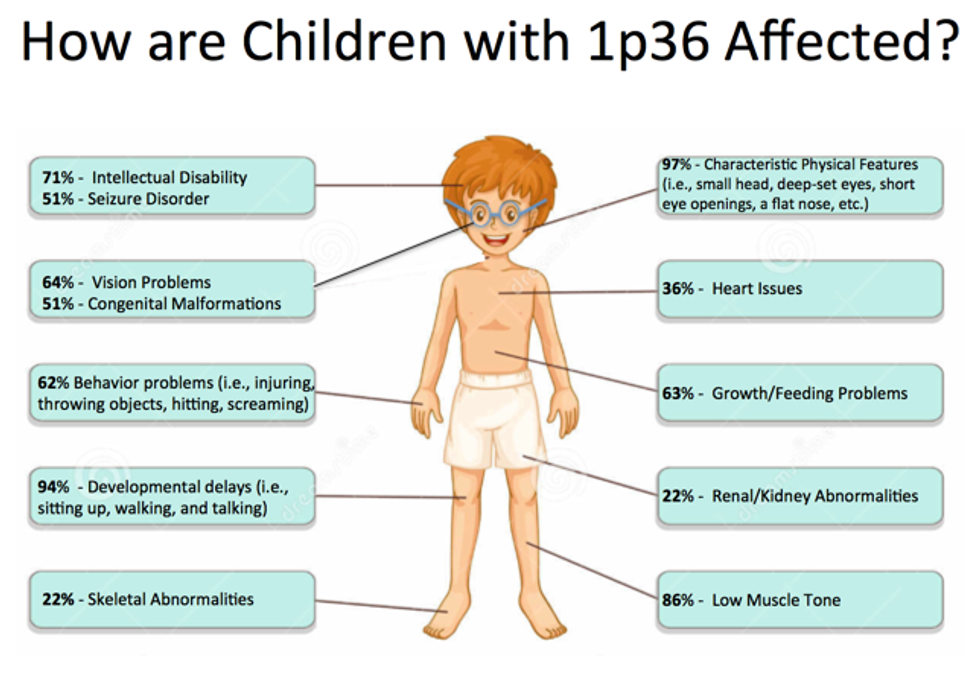Rare Disease Day happened on Tuesday, February 28. What shocked me about this was that social media platforms had been silent about this, it wasn't even a trending topic. However, a couple weeks later #nationalpuppyday was trending on multiple social media platforms. Yes, dogs are very cute but are they more important than learning about the challenges that people who might be our friends and neighbors are facing. Honestly, I had never thought twice about Rare Disease Day up until my youngest cousin was diagnosed with 1p36 Deletion Syndrome, which occurs in only one in every 5,000 to 10,000 births.
What is 1p36 Deletion Syndrome?:
First off, it is pronounced one, P, three, six. Not one p thirty-six. 1p36 Deletion Syndrome is also known as Monosomy 1p36 Deletion Syndrome. It is a genetic condition where a small amount of genetic material is missing from the tip of the sort-arm of chromosome one. It can cause minor changes in physical appearance, birth defects and a varying degree of intellectual disabilities. Each child is unique to the symptoms they acquire but many of them share the following common characteristics.
◦ Low muscle tone (congenital hypotonia): Can delay sitting, crawling and walking. Most kids walk at four and a half years, and roll at two and a half.
◦ Seizure Disorder
◦ Growing & Feeding Problems: Some children don't gain weight due to the difficulty they have sucking and swallowing.
◦ Distinctive Physical Features: Not all have this but majority of children often have a smaller head, large soft spot, deep-set eyes, short eye openings, low set ears, a small mouth, pointed chin, flat nose, and prominent forehead. Keep in mind this will vary depending on the child.
◦ Developmental Delay: Speech is the most commonly delayed skill compared to others.Sign language or assisted communication devices, are very common and easier communication skills for children with 1p36 Deletion Syndrome.
◦ Intellectual Disability: Some children with 1p36 Deletion Syndrome are fortunate enough to be able to go about their day not needing assistance with their day and other children are not verbal and require a constant care.
◦ Congenital Malformations: Babies can be born with cleft lip, cleft palate or heart defects and malformation of the brain.
◦ Cardiomyopathy: When the heart is too enlarged and does not pump as strongly as it should.
◦ Hearing Loss: Can beconductive or sensorineural. Is typically treated like other children with hearing loss, for example, a hearing aid.
◦ Vision or Eye Problems: Children with 1p36 Deletion Syndrome have been reported to have vision problems. These problems can usually be improved with the use of glasses.
◦ Behavior Problems: Includes self-injuring behavior, throwing objects hitting people and screaming episodes.
The Better Together Family:
Many parents once they had been old that their child has been diagnosed with a disease, let alone a rare one tend to get very upset and feel that the world is crumbling down. In situations like that there are really only two options. The first being that they could sit down all day in a slump and accept the fact that their child will never meet up to what society deems "normal". The second option is when the situation is viewed in a glass half-full kind of way.
Ever since my aunt and uncle had found out that their first son, Anthony Jr. had been diagnosed with 1p36 Deletion Syndrome they have been anything but pessimists. Finding out that your child has a rare diagnosis is shocking and terrifying. They have put together a blog to help families going through what they are and provide a better understanding of 1p36 Deletion Syndrome and overcoming the obstacles they face.
Fortunately, Anthony Jr. has been pushing through and beating the statistics. At only a year and couple months old he is already showing facial expressions such as smiling, laughing and understanding his surroundings and is able to roll around. Other children with 1p36 Deletion Syndrome are unresponsive to their surroundings and things going on around them. Anthony Jr. does wear hearing aids, which is not an uncommon thing. People without 1p36 Deletion Syndrome wear them too. Hearing aids can offer dramatic improvement for most people with hearing loss and may not have to be worn as the user gets older. One challenge that is faced by them is that Anthony Jr. has a significant amount of seizures each day. Currently, they are finding help in Boston and hopefully the seizures will stop. Although, I am just an outsider looking in, and am not a part of their small little family from my point of view all I have to say is that my aunt and uncle are pretty damn kick ass.
I encourage you to check out their blog, Better Together Family.




















